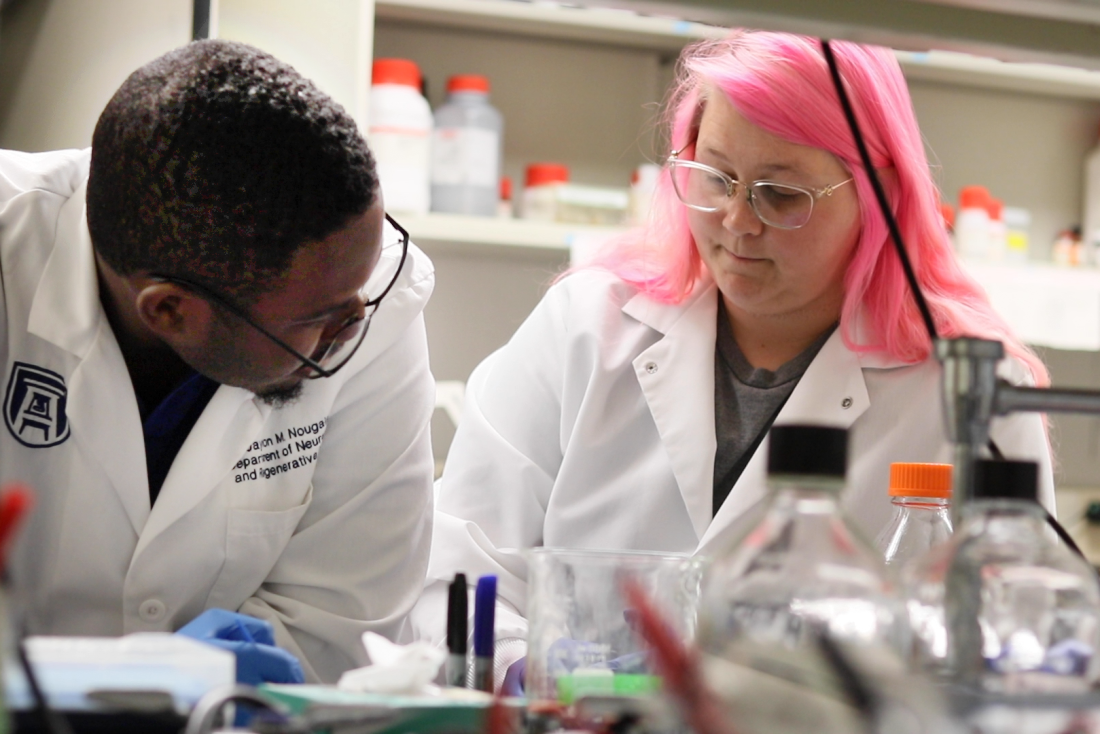Augusta University’s College of Science and Mathematics is bolstering its programs with a brand-new degree.
The new Bachelor of Science in Neuroscience was approved by the University System of Georgia Board of Regents at its April meeting and the program is set to begin in fall 2023.
“Undergraduate programs in neuroscience are an increasingly popular choice for students interested in careers in research or the health care professions,” said College of Science and Mathematics Dean John Sutherland, PhD. “Augusta University is ideally suited as a venue for a bachelor’s degree in neuroscience because of the broad range of fundamental disciplines represented in the College of Science and Mathematics and other units.”
AU has a graduate program in neuroscience through The Graduate School, but this is the first time the degree option is available to undergraduate students.
“If I had the opportunity to focus on neuroscience in my undergrad, then I certainly would have,” said Kirstyn Denney, a student at AU’s graduate neuroscience program. “It would have provided a more structural foundation of the major concepts in neuroscience.”
The program is designed to be interdisciplinary, drawing from every major within the college. As students progress through the degree, electives such as neuropharmacology become available to help them specialize in an area of their choice.
“A student who signs up for a BS in neuroscience can expect to have a wide array in the classes they take. The courses that are specified as the required part of the major come from biology, neuroscience and psychology,” said Cathy Tugmon, PhD, associate dean of academic and graduate affairs for the College of Science and Mathematics. “We have tried to design the degree in such a way that it allows the student to choose their required electives to be in the subject areas that fit best into their future plans and that they might be very interested in.”
Lab work is also a big priority of the program, and all students will take a required course to learn lab techniques. Additionally, majors will directly contribute to new discoveries through a faculty-mentored research experience.
“These courses come with a variety of labs,” said Michael Hoane, PhD, chair of the Department of Psychological Sciences. “One of the unique experiences with a neuroscience major is the curriculum is very hands on.”
A major advantage of having both degrees available is that it offers students a chance for research collaborations with neuroscience faculty at the Medical College of Georgia.
“We will have neuroscientists being trained potentially at AU from the time they enter as a freshman, and we are excited about a subset staying to complete their PhD work,” said Lynnette McCluskey, PhD, co-director of the neuroscience graduate program.
Another benefit of an undergraduate neuroscience degree is the flexibility it offers students, since it is not strictly a pre-med degree. Neuroscience can be applied across many health care fields or in research to uncover more mysteries about the brain. The lab experience through the neuroscience program gives students much-needed skills that can be applied collaboratively in many areas, Hoane said.
“Most of these students, although they might start on the medical track, find that they really love research, and that opens up a lot of opportunities to them. A neuroscience major is a great mixture of students who are going to be on that medical, dental or other allied health tracks, and those who are coming from other departments and various research tracks,” Hoane said.
These opportunities for aspiring neuroscientists are important because the demand for neuroscientists in the industry is only increasing, McCluskey added.
“Neuroscience is becoming increasingly important as a discipline, as one in six Americans currently have a neurologic disorder, and those numbers are projected to snowball,” McCluskey said. “We need more neuroscientists in this country to figure out solutions to those awful diseases.”
 Augusta University
Augusta University




